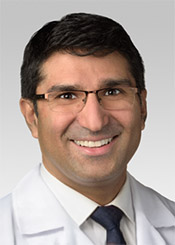Satish Nadig, MD
Professor, Surgery

Research Program
- Associate Members
Cancer-Focused Research
I am an adult and pediatric multiorgan abdominal transplant surgeon, Chief of the Division of Transplant, and Director of the Comprehensive Transplant Center with an active laboratory in transplant immunology at Northwestern University-Feinberg School of Medicine. I currently hold the Edward G. Elcock Endowed Chair in Organ Transplantation and the focus of my research since 2005 has been centered around immunoregulation and tolerance induction in the setting of organ transplantation. Much of the work done in our laboratory has roots in oncologic investigations. Specifically, over the past 8 years, my laboratory has been interested in various allograft pretreatment strategies and modalities to induce tolerance including the utilization of triggered- release nanoparticle therapy as a vehicle for immunotherapeutics, for which we have received National Institutes of Health funding and two issued patents with other patents pending. This work stemmed directly from work done in cancer to use nanotherapeutics to target chemotherapies to specific tumor types. Currently, I hold R01-funding (R01 AI142079) which supports investigating the manipulation of an organ's immunometabolism prior to transplantation (while in the preservation phase) at the mitochondrial level in order to prevent the robust presentation of antigen by the allograft upon implantation and subsequent ischemia-reperfusion injury. Much like mitochondrial morphologic changes can render a T cell more or less tumorogenic, these pre-treatment strategies are used to prevent acute rejection and chronic organ dysfunction. Tolerance induction has been an interest of mine for over a decade and, early on, I was able to capitalize on studies performed during my doctorate and publish one of the first descriptions of the use of human regulatory T cells (TReg) in a humanized mouse model system in Nature Medicine. Based in part on this work, applying TReg as a cellular therapy to organ transplant recipients is now in clinical trials.
